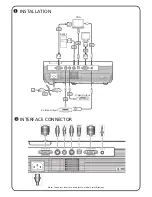
Chapter 5
Operation of Function — Network connections
ENGLISH - 107
f
When a LAN cable is used to transmit and receive Ethernet signal, please connect it to the <LAN> terminal or the <DIGITAL LINK/LINK>
terminal of the projector.
f
Use a LAN cable that is straight cable or cross cable and compatible with CAT5 or higher. When you need to know whether to use one or
both straight/cross cable depending on the configuration of the system, please confirm with your network administrator. For this projector, it
will identify the type of cable (straight/cross) automatically.
f
Use a LAN cable with length of 100 m (328'1") or shorter.
Example of network connections via a twisted-pair-cable transmitter
Computer
Projector
LAN cable (straight)
LAN cable (straight)
LAN cable (straight)
Hub
Twisted-pair-cable transmitter
(with LAN terminal)
Attention
f
When a LAN cable is directly connected to the projector, the network connection must be made indoors.
Note
f
For the LAN cable between a twisted-pair-cable transmitter and the projector, use a cable that meets the following criteria:
g
Compatible with CAT5e or higher
g
Shielded type (including connectors)
g
Straight-through
g
Single wire
f
The maximum transmission distance between the twisted-pair-cable transmitter and the projector is 100 m (328'1"). It is possible to transmit
up to 150 m (492'2") if the twisted-pair-cable transmitter supports the long-reach communication method. However, the signal that the
projector can receive is only up to 1080/60p (1 920 x 1 080 dots, dot clock frequency:148.5 MHz) when connected with the long-reach
communication method. If this distance is exceeded, image may be disrupted or a malfunction may occur in LAN communication.
f
When laying cables between a twisted-pair-cable transmitter and the projector, check that cable characteristics are compatible with CAT5e
or higher using tools such as a cable tester or cable analyzer.
When using a relay connector midway, include it in the measurement.
f
Do not use a hub between a twisted-pair-cable transmitter and the projector.
f
Do not pull cables forcefully. Also, do not bend or fold cables unnecessarily.
f
To reduce the effects of noise as much as possible, stretch out the cables between the twisted-pair-cable transmitter and the projector
without any loops.
f
Lay the cables between a twisted-pair-cable transmitter and the projector away from other cables, particularly power cables.
f
When installing multiple cables, run them side by side along the shortest distance possible without bundling them together.
f
After laying the cables, confirm that the value of [SIGNAL QUALITY] in the [NETWORK] menu
→
[DIGITAL LINK STATUS] is displayed in
green (indicates normal quality). (
x
page 101)
f
For twisted-pair-cable transmitter of other manufacturers of which the operation has been verified with the DIGITAL LINK compatible
projector, refer to Panasonic website (http://panasonic.net/avc/projector/). Note that the verification for devices of other manufacturers
has been made for the items set by Panasonic Corporation, and not all the operations have been verified. For operation or performance
problems caused by the devices of other manufacturers, contact the respective manufacturers.
Projector settings
1) Use the LAN cable (Straight) to connect the projector with computer.
2) Turn on the projector.
3) Press the <MENU> button to display the [NETWORK] menu, and then select [WIRED LAN], and press
the <ENTER> button.
4) Set the detailed setup of [WIRED LAN].
f
For details, refer to “WIRED LAN” (
x
page 102).
Содержание PT-FW530
Страница 40: ...40 ENGLISH Chapter 3 Basic Operations This chapter describes basic operations to start with ...
Страница 105: ...ENGLISH 105 Chapter 5 Operation of Function This chapter describes the operation methods of some functions ...
Страница 140: ...140 ENGLISH Chapter 7 Appendix This chapter describes specifications for the projector ...
















































